Every music teacher wants more students. If you teach private music lessons in your local area, you need to learn how to grow a music school using Google’s local search. We’ll explain some of the nuances about Google’s local search as it pertains to music schools, and we will show you how you can master them to gain a competitive advantage over your competition. If you engage your marketing strategy with a dominant local search presence, you will tap into a channel that can drive a continuous stream of new music students to your website.
What does Google do?
You probably already have a reasonable idea of how Google works. When you type in a search query, some results display. The page that Google displays after you type in your query is called a SERPs page. SERPs is just an acronym for Search Engine Results Pages. Below is an example of a SERPs page. We break the SERPs page into three distinct sections. The section we colored red (#1) are organic results. The section we colored purple (#2) are local search results. And the section we colored green (#3) are pay-per-click results from Google Adwords.
How does Google decide what web page results to display when you type in specific keywords?
If your goal is to grow your music school, the answer to this question is the key to planning your entire website strategy. Let’s start with the definition of a keyword. The definition below may not be mainstream, but it’s a definition that will serve you well as you think about your music lesson website.
keyword
- a single word or a group of words, that when put into a search query, convey intent to a search engine. A keyword can be one word, like “music,” or it can be multiple words, like “music lessons for children.”
To make this definition clearer, let’s use some examples. Suppose someone goes to Google and types: Music. What is the searcher’s intent? We don’t know. Music is a one-word keyword, and because it is so short, it isn’t possible to know what the intent is with any degree of certainty. It could be a person looking to download music. It could be someone looking for the definition of the word “music.” It could be a lot of things. All Google can do is guess at the intent, which you can see below.
To rank on the first SERPs page for a one-word keyword is nearly impossible. Google scans billions of web pages and ranks them on a variety of metrics. Without getting too deep into how they do that (we will save that for another article) know that the top-ranking page has the most “page authority” for the keyword that the searcher typed in. Pages with less page authority rank lower in the SERPs.
Now consider a different search phrase: Children’s music lessons. While the intent is much clearer with this keyword, it is still somewhat ambiguous. It could be someone searching for “online” music lessons for children. It could be another music teacher interested in tips on how to teach music to children. We also don’t know the instrument since the word “music” is generic. When a keyword or key phrase only has one, two, or three words, it can be considered a short-tail keyword.
Now let’s assume someone types: piano lessons for kids near me. This keyword has obvious intent. It’s far more useful, and if you happen to teach piano to young kids near that searcher’s town, you would want to rank for it. If the searcher clicks your listing, you have an excellent opportunity to acquire a new student.
Should I try to have my music teacher website rank for organic listings?
Local search and organic search are two distinct sections of the SERPs page, as you can see from the image at the beginning of this article. However, there are overlapping strategies for someone who is trying to rank in both organic and local. In other words, some of what you’ll do to increase your chances of ranking in local will also apply to attempting to rank in organic. For that reason and other reasons, yes, to increase your chances of growing your music school via Google search, you should try to get your music teacher website to rank for organic — the more real estate you own on a SERPs page, the higher your chances of getting clicked. However, showing up in the organic section can be more challenging and less productive. Look at the screenshot below, and pay attention to the results with a pink background.
The results highlighted in pink are sometimes referred to as aggregators. Aggregators are websites, such as Yelp, Care.com, and others, that have enormous page authority. Their business model is to compile data from other websites and dominate the SERPs. For example, assume you are looking for a restaurant. You might click on Yelp and then have to search again for the restaurant in Yelp, instead of finding it directly from Google. Some aggregators make businesses pay to be a part of their ecosystem. Without getting too much into whether or not aggregators are good or bad, just know that they occupy a lot of the organic spots on a SERPs page. If you want to list on page 1 of the organic listings, you may have a lot of aggregator sites to compete against. In the example from the image above, you can see that nine of the ten listings on the SERPs page are aggregators.
So why bother trying to rank for organic at all? One reason is that Google does update it’s algorithm every so often to improve the user experience. It’s possible that Google will update their algorithm and move aggregator sites to a different place on the SERPs. If you continue to focus on good SEO (search engine optimization) practices for organic listings, then you may be rewarded by a rapid jump in the organic part of the SERPs.
Another reason is that many searchers do not want to click on aggregator sites. Many searchers scan right past them and click lower ranking sites that are not aggregators, even if they have to click to page two or three of the SERPs.
But we are going to focus on local search in this article, so the big reason to not neglect organic rankings is that it simultaneously helps you with local rankings if you follow the tips in this article.
Understanding local search for music teacher websites
Take a look at the image above. It is the part of the page that lists the local results. This particular set of results happened when I typed “piano lessons for kids near me.” There are a few important things to notice.
The first is that there are three natural results in this section. The forth is a paid result. Google has a feature that now allows certain Adwords results to display in the local search section. Paid local search is a great option if the local search section is very competitive. However, in this article, we are just going to focus on the natural search results, of which there are three that display. Google only displays three, but the searcher can find others by clicking the “More places” link near the bottom. Most clicks come from the top 3, so you want to rank there.
Local search is advantageous to you because you aren’t competing against the entire world. You are only competing against other music schools in a small radius near you — about an 8-mile radius, in fact. Most people who type in a keyword query with local search intent will click one of the top three results in the local search box.
How to grow a music school by dominating the local search results!
To show up in local search results, Google needs to know a bit about your business. First, it needs to understand what your business does. Next, it needs to know where your business is. There’s a bit more to it, but that the gist of what Google needs to know. For organic listings, Google deduces that information based on your web page’s content. In local search, you tell it directly to Google. You do this by using something called a GMB, which is an acronym for “Google my Business.” GMB is essentially Google’s way of finding out about your business. You create a GMB profile, and Google will send you a postcard with a verification code on it so it can verify your business’s location. And because Google has several ways to deduce where the searcher is, Google can display your business if it’s near the person searching.
When you fill out the GMB profile you will be asked:
- Your business location/address
- Your business’s phone number
- Your business’s website
- Business hours (Recommend that you use the same settings as you do in your MusicTeacherNotes.com account)
- Your business’s category (Choose a primary category and several applicable secondary categories)
- GMB Categories
Just like organic rankings, Google ranks local businesses, too. If there are twenty music studios in your local area, Google has to rank them somehow. And because Google only displays the top 3 of those results in the local search part of the SERPs, you need to understand how to increase your chances of ranking near the top.
Consider the keywords and categories you want to rank for very carefully. Imagine you are a parent who is interested in finding a piano teacher for your child to take lessons from. What would you type into Google? Here are some likely queries:
- piano lessons near me
- piano teacher near me
- piano instructor near me
- piano lessons for kids near me
- piano teacher for children near me
- piano instructor for beginners near me
- piano lessons [location name]
- piano teacher [location name]
- piano instructor [location name]
- piano lessons for kids [location name]
- piano teacher for children [location name]
- piano instructor for beginners [location name]
Google updates GMB all the time, but as of this writing, the options for music teachers to use as categories were:
- Music Instructor
- Music School
- Guitar Instructor
- Guitar Store
- Piano Instructor
- Drum School
- Vocal Instructor
Suppose you teach several instruments, like guitar, piano, and saxophone. How do you choose the best category if you have that common issue? First, consider what most people type and how big the competition is. Do a search for different types of music lessons in your local area to see who shows up. That can help you strategize. Consider how many students might be searching as well as what you want to teach. If you teach drums and piano, but you don’t want to teach drums, you should focus on what you like.
Google lets you choose secondary categories, as well. For example, you could choose
- PRIMARY CATEGORY: Guitar Instructor
- SECONDARY CATEGORIES: Music Instructor, Music School, Guitar Store
That will allow you to rank for the secondary categories, but only the primary category displays on the result page, as you can see in the image below.
What about reviews for local search?
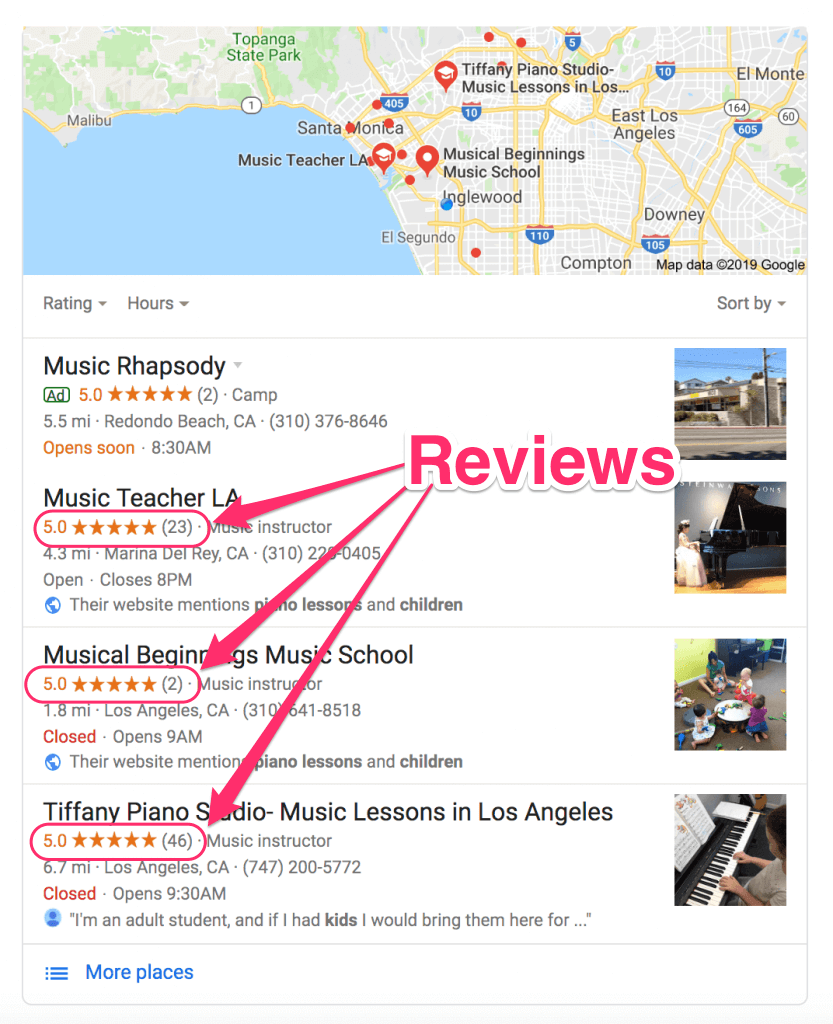
Should I add keywords to the name of my business?
Notice the names of the businesses. Keywords in the business name may help you rank for those keywords. However, they can also get you suspended and kill a significant portion of your business. Assume the name of your company is “Bob’s Music Lessons,” but in your GMB profile, you call it “Bob’s Music Lessons – Guitar, Piano, and Drums.” That is called keyword stuffing. Google considers keyword stuffing a type of web spam. From a user experience perspective, it makes sense. You don’t want to look on Google Maps for a business and see dozens of extra keywords next to their business name. A lot of businesses get away with it, but it can backfire because Google can suspend accounts they catch doing it. Google expects businesses to enter the exact name of their business on their GMB profile. If you can incorporate legitimate keywords into the actual business name that you choose when you create your business, that is one thing. But using extra keywords in the title on your GMB is another.
What kind of image should I use for my music lesson business when I create my GMB profile?
When someone types in piano lessons for children near me, the ideal situation would be that the image on the map search would be a nice, authentic picture of you teaching a child the piano. However, if you teach multiple instruments, you cannot cover every possible situation. In that case, you need to choose an image that works for most situations. The images you see chosen below are generally acceptable, except for the paid ad. The paid ad shows the outside of the building where they are located. While this might seem like a good idea, it doesn’t convey to the user what the music lesson experience might be like. Additionally, the business location might change, and the music school will need to find a different image. It would be best to choose an image that allows someone to visualize and image the music lesson experience with you.
What are some other tips to increase the likelihood that my music studio will show up in Google local search?
There are lots of great tips for local search online. This video called, “How to rank in Google Maps tutorial,” covers a lot. It isn’t specific to a music teacher trying to grow a music school, but the tips are invaluable.
Make sure your information is complete and accurate
If you do not completely fill out the GMB profile, you decrease your chances of showing for local searches. Google’s algorithm is better able to match a searcher to your listing your provide complete information about your music studio.
Update your GMB profile as your business changes
Local search can be a powerful tool. As such, you should make it a priority to take care of it. Update your GMB profile if your music studio changes. Add new photos and videos to it as you can. Keep it up-to-date, and it will pay off.
Set accurate hours
As a music teacher, you might have unusual hours. Enter your general availability for each day of the week. To grow your music school you need students to contact you. This means you don’t want to show closed for lessons when you might actually be available.
Respond to your reviews
Reviews are powerful. Many people consider an online review as trustworthy as a personal recommendation from a friend. If someone gives you a review, you should reply to it. You might simply say, “Thanks!” You could add a little more as appropriate. If someone gives a negative review, you should also reply, even if uncomfortable. You should:
- Evaluate and consider their negative feedback.
- Respond to the negative review publicly via GMB.
- By courteous and empathetic while offering solutions.
Add photos
The cliche is that a picture is worth a thousand words. It’s certainly true when someone is trying to visualize an experience. You can upload photos of you teaching different instruments and age groups to your GMB profile, helping people see just what it is you do.
Spend the money to have a superb website
You will list your website on your GMB profile. We will save what makes for a great music instructor website in another article, but understand that your leads will go to your website. Most leads will do that on a phone or mobile device. You need to fast, mobile-friendly website for your music lesson business if you want to compete.
In conclusion
Google’s local results are based on three primary factors: relevance, distance, and prominence. Relevance means Google will want to rank you if you match the intent of a Google search. Distance means the closer your business is to the searcher, the more likely you are to show up. Prominence is a bit more involved. Prominence is kind of everything Google sees about your business. Google can discern if you have Yelp listings, a Facebook page, a Twitter account, and more. They also scan your website. The more prominent you are in those places, the higher your prominence score, and the more likely you are to rank.
Ranking on Google local search is a very worthwhile way to spend marketing time for your music studio. Ultimately you just want to know how to grow a music school, and there are certainly many ways to attract new music students to your website. But local search can provide a steady stream of new leads indefinitely, and that’s why it’s well worth the effort.

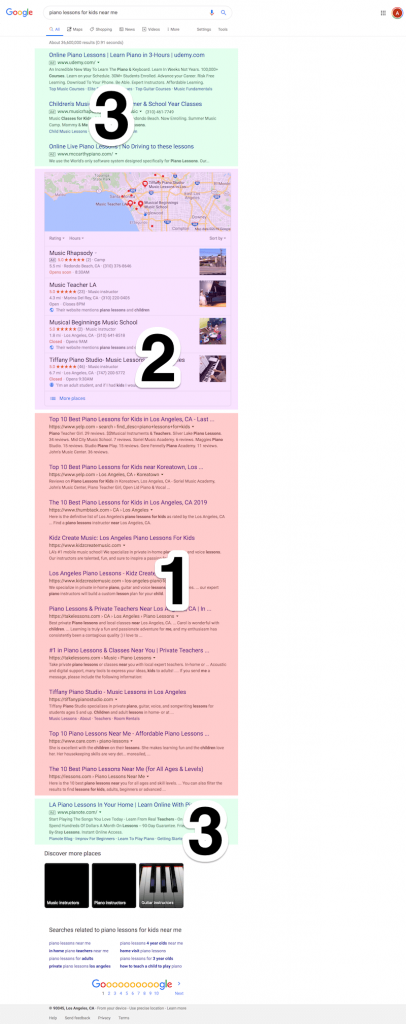 CLICK TO SEE FULL SIZE IMAGE
CLICK TO SEE FULL SIZE IMAGE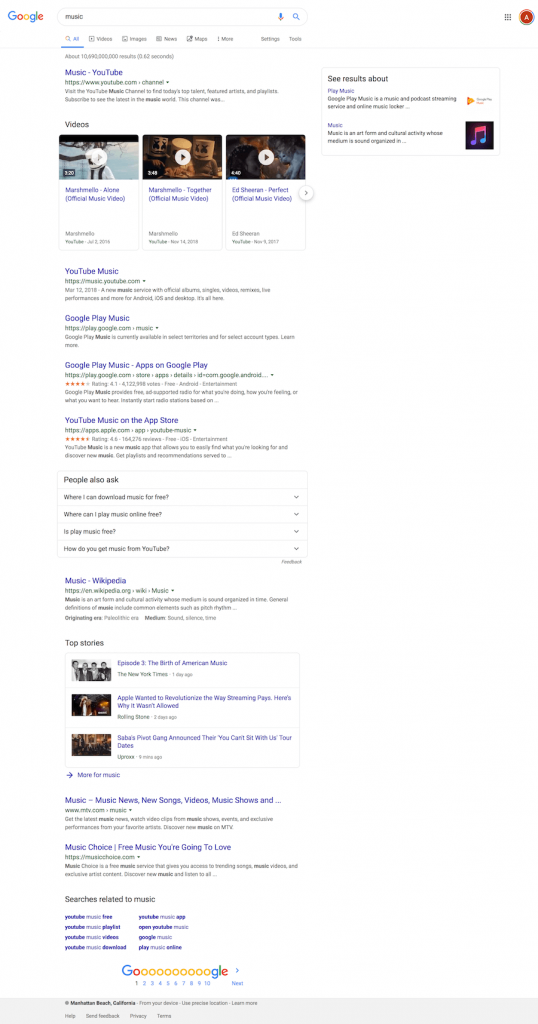
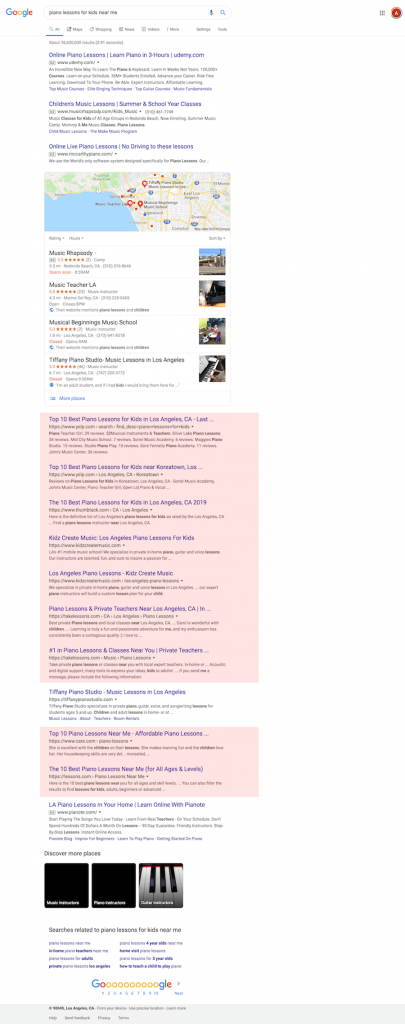
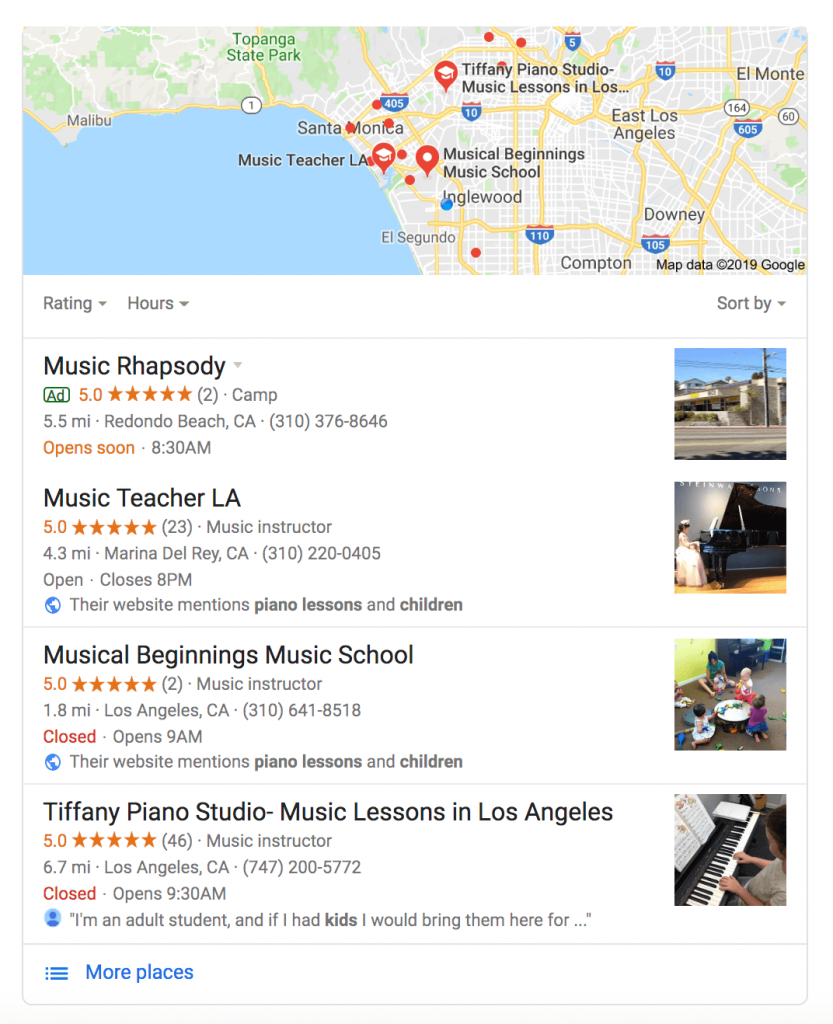
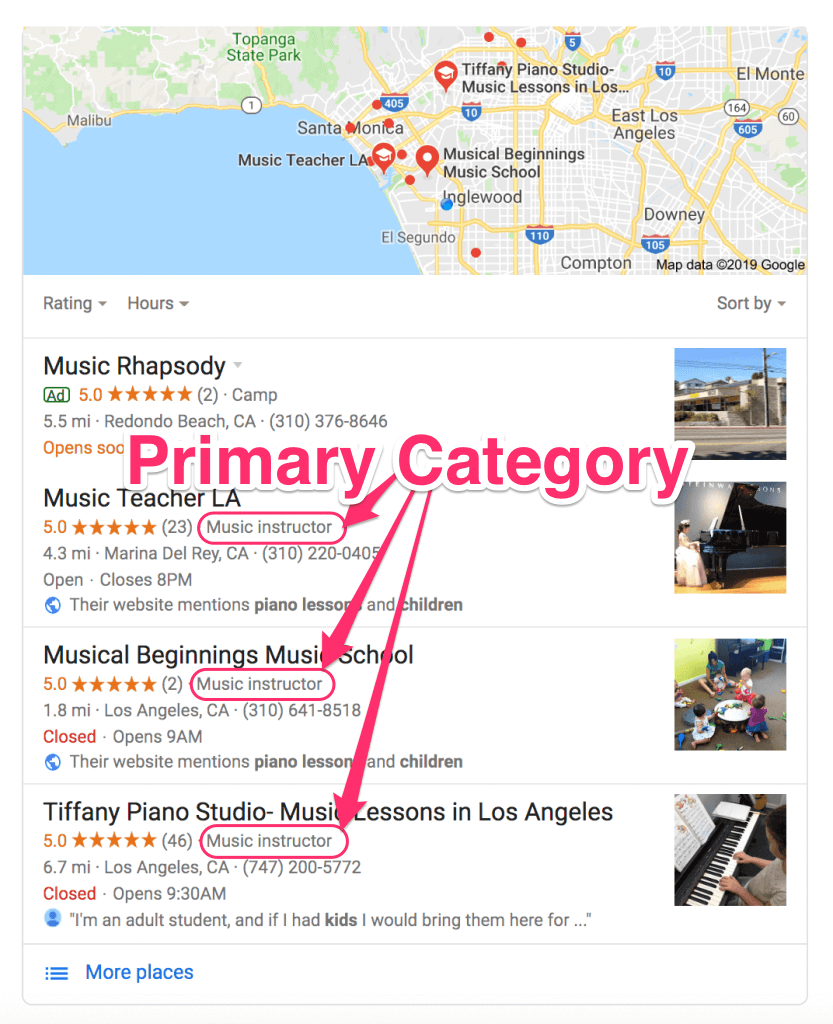
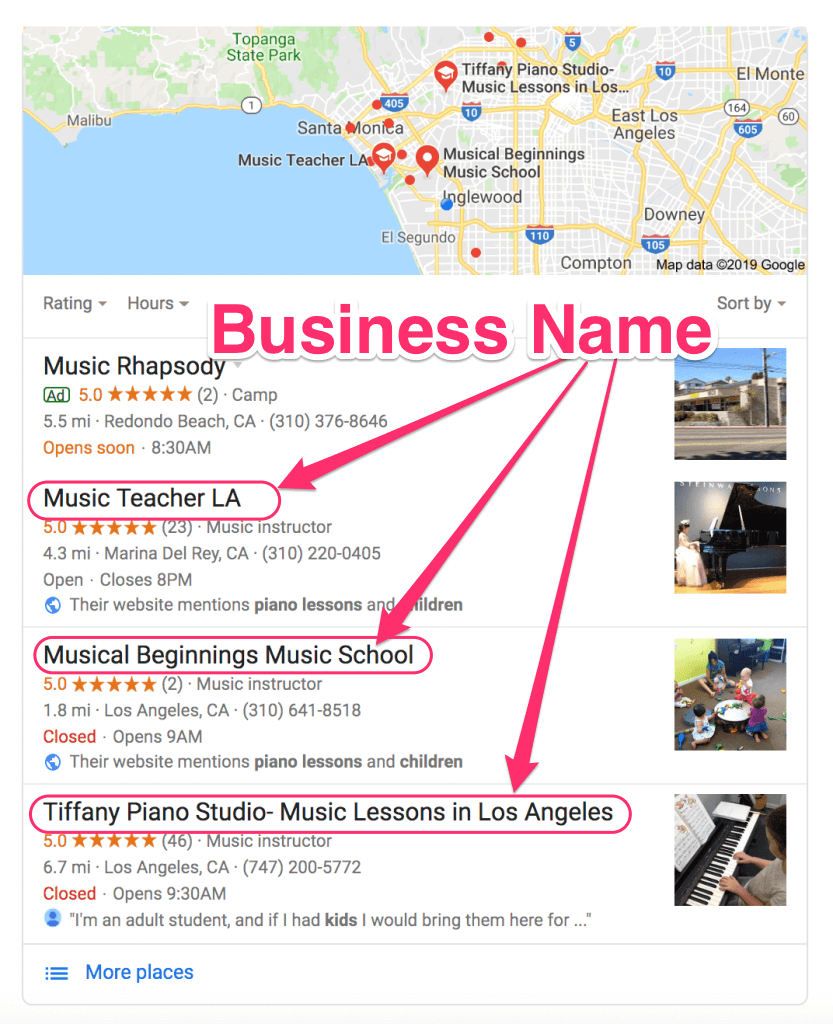
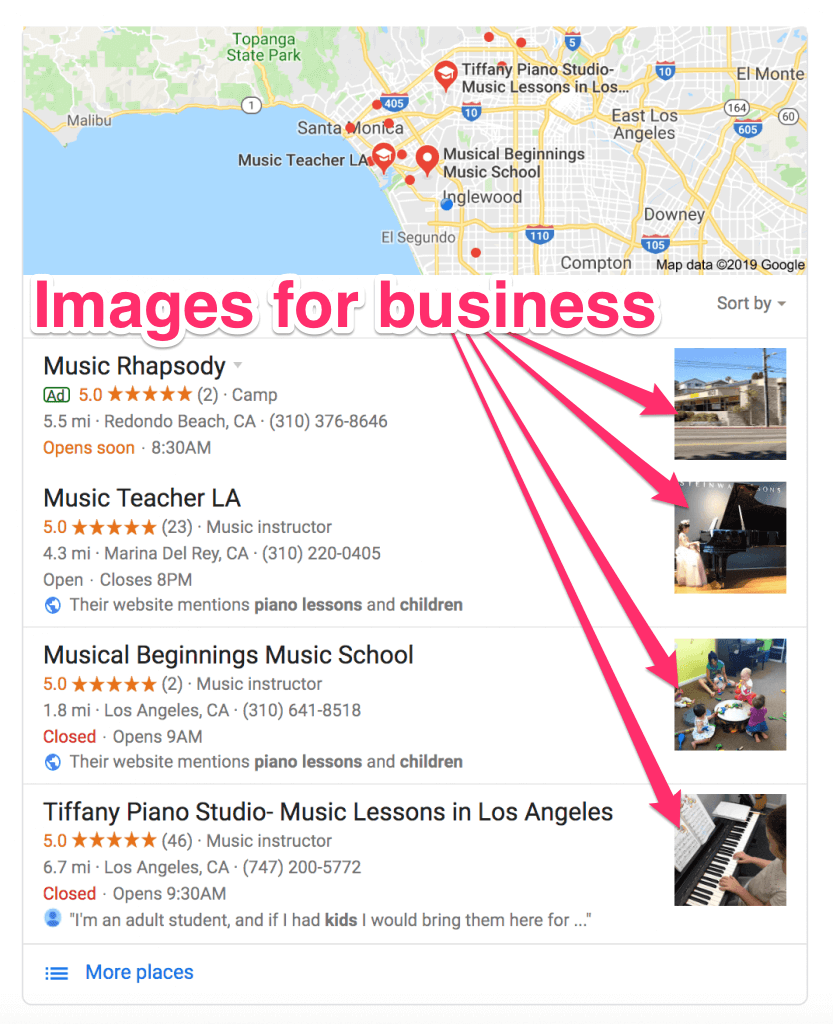
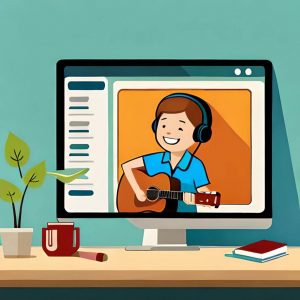 Do you want to get more students and grow your music teaching business?
Do you want to get more students and grow your music teaching business?